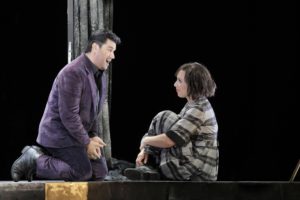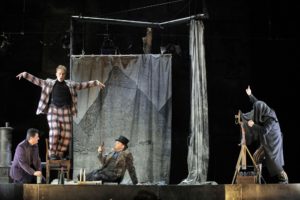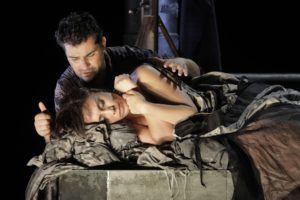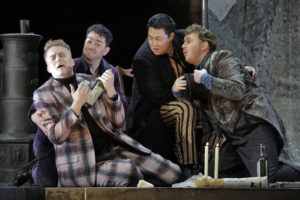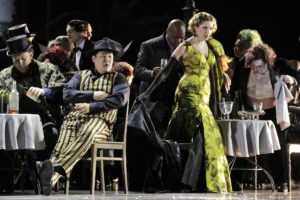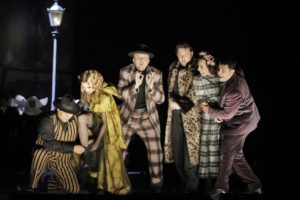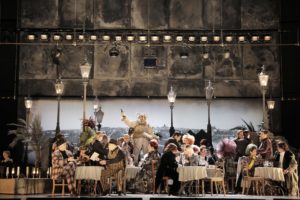A LOW RENT BOHÈME
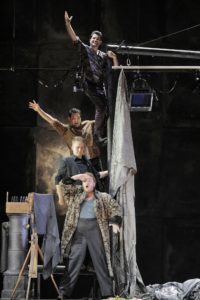 It’s hard to go wrong (in general) with Giacomo Puccini’s 1896 opera ’” a relatively light tragedy buoyed with easy-to-love characters, provocative music, and a lot of humor. The latest production that opened LA Opera’s 2019/2020 season manages somehow to offer a production that left me dry-eyed at the end, which never happened during previous visits to La Bohème. An opera about life and death becomes an opera about self-absorbed Bohemians. Sure, it’s always gorgeous to listen to, especially with this orchestra, which never sounded better under conductor James Conlon, conducting La Bohème for the first time with LA Opera as he beautifully draws out all the score’s romantic sonorities. (Artistic Director Plácido Domingo, who sometimes conducts, was nowhere to be seen or heard from on opening night, as he still faces accusations of sexual misconduct). Director Barry Kosky says in the program notes that the opera is about death. But that didn’t mean he had to suck the life out of this perfect score.
It’s hard to go wrong (in general) with Giacomo Puccini’s 1896 opera ’” a relatively light tragedy buoyed with easy-to-love characters, provocative music, and a lot of humor. The latest production that opened LA Opera’s 2019/2020 season manages somehow to offer a production that left me dry-eyed at the end, which never happened during previous visits to La Bohème. An opera about life and death becomes an opera about self-absorbed Bohemians. Sure, it’s always gorgeous to listen to, especially with this orchestra, which never sounded better under conductor James Conlon, conducting La Bohème for the first time with LA Opera as he beautifully draws out all the score’s romantic sonorities. (Artistic Director Plácido Domingo, who sometimes conducts, was nowhere to be seen or heard from on opening night, as he still faces accusations of sexual misconduct). Director Barry Kosky says in the program notes that the opera is about death. But that didn’t mean he had to suck the life out of this perfect score.
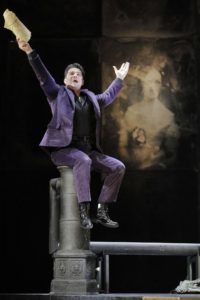 The opera’s four-act libretto, written by Luigi Illica and Giuseppe Giacosa, is based on Henri Murger’s 1851 collection of short stories, Scènes de la vie de bohème. If you’re not acquainted with La Bohème, you may recognize the storyline from a little musical called Rent. Despite their non-existent income and subsequent lack of heat, four Belle Époque artist friends exist in happy poverty within Paris’s Latin Quarter. The central relationship is between the writer Rodolfo and his neighbor Mimì, a consumption-suffering embroiderer of flowers. The two garret-dwellers love each other fervently but must break up due to Mimì’s illness and Rodolfo’s inability to communicate and care for her financially. A secondary plot concerns Rodolfo’s roommate Marcello and his relationship with the beautiful Musetta with whom he is constantly battling as she’s a commitment-phobe who seesaws between dating the poor painter and flirting with Paris’s upper-class bachelors. Musetta will later discover Mimì dying and bring her to the boys’ atelier, where Rodolfo and Mimì confess their love just before she dies.
The opera’s four-act libretto, written by Luigi Illica and Giuseppe Giacosa, is based on Henri Murger’s 1851 collection of short stories, Scènes de la vie de bohème. If you’re not acquainted with La Bohème, you may recognize the storyline from a little musical called Rent. Despite their non-existent income and subsequent lack of heat, four Belle Époque artist friends exist in happy poverty within Paris’s Latin Quarter. The central relationship is between the writer Rodolfo and his neighbor Mimì, a consumption-suffering embroiderer of flowers. The two garret-dwellers love each other fervently but must break up due to Mimì’s illness and Rodolfo’s inability to communicate and care for her financially. A secondary plot concerns Rodolfo’s roommate Marcello and his relationship with the beautiful Musetta with whom he is constantly battling as she’s a commitment-phobe who seesaws between dating the poor painter and flirting with Paris’s upper-class bachelors. Musetta will later discover Mimì dying and bring her to the boys’ atelier, where Rodolfo and Mimì confess their love just before she dies.
Sure, we get an appropriately youthful cast, but the singing is only adequate for most, and spectacular for very few. While director Barry Kosky’s movement is much livelier than the normal fare at LA Opera ’” given the playful and sometimes drunk quartet at the center of the tale ’” his direction of the actors’ emotional state is rather cursory.
The worst culprit of all is Rufus Didwiszus’s dreary set design: the painter and partier Marcello has been turned into a fin de siècle photographer with box camera for making daguerreotypes (although the supertitles don’t reflect that, so it can confuse newcomers); as such, the large, faded black-and-white backdrops of early Parisian photos are truly uninspired and baffling on a near-naked stage (I can only suspect that Komische Oper Berlin’s production fit its 1,270-seat theater much better than the 3,156-seat Dorothy Chandler Pavilion).
Costumer Victoria Behr has taken inspiration from this motif, and the results are ghoulish-looking checkered oufits; the costuming beats us over the head with the pallor of death; only the singer Musetta gets a lively, floral print (because she’s the opposite of the sickly Mimì, get it?).
Speaking of Musetta, the Christmas Eve panorama in the riotous Café Momus scene in Act II is when directors usually pull out all the stops. Here, the revolving stage and all the busy goings-on made it oddly unlively; you barely know where to focus your eyes. The LA Children’s Chorus dressed as black-clad Pierrots confusingly danced downstage like a chorus line, and Parpignol, the toy seller, looks like some kind of horned demonic rabbit clown. Neighborhood revelers swirl around the twirling stage as barely clad gigolos and gigolettes, making you wonder why the Bohemians are freezing at home when people are dancing near-naked in the streets.
All of this would have been forgiven had the cast been uniformly excellent. The standout is American soprano Marina Costa-Jackson, who makes her LA Opera debut as Mimì. Her luxuriant, sublime, soaring, expressive voice thrilled the audience; easily, the most emotional part of the night was her coy rendition of “Si, mi chiamano Mimì” (“Yes, they call me Mimì”). Saimir Pirgu was easy on the eyes as Rudolfo, and has a sumptuous animated tenor which blended well with Costa-Jackson’s soprano on such duets as “O soave fanciulla” (“Oh lovely girl”), but frankly didn’t have the voice to carry a Puccini opera to such a large opera house.
As the supporting couple Marcello and Musetta, Kihun Yoon and Erica Petrocelli are very capable but she’s not so magnetic; it was tough to buy them as a couple. The strong-voiced Yoon (who is dressed like a gangster from Guys and Dolls) takes Marcello’s comically inclined character to the hilt but failed to find an endearing depth to the emotionally explosive painter, er, photographer. Nicholas Brownlee and Michael J. Hawk round out the group of bohemians as the commanding Colline and the jovial and generous Schaunard, respectively. As Musetta’s rich suitor, Alcindoro, I couldn’t even hear Patrick Blackwell.
photos by Cory Weaver/LA Opera
La Bohème
a production of the Komische Oper Berlin
LA Opera
Dorothy Chandler Pavilion, 135 North Grand Ave.
ends on October 6, 2019
for tickets, call 213.972.8001 or visit LA Opera
